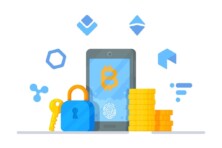Here is a list of the most promising blockchain companies

Top 20 blockchain companies worldwide. Source: shutterstock.com
Blockchain technology disrupts numerous industries like payments, cybersecurity and healthcare. Blockchain companies serve as third-party providers of blockchain infrastructure by designing and developing multi-functional blockchain applications.
1. DocuSign
Electronic signature technology is a key to digitalisation of public services. DocuSign is the undisputed leader in this segment. It has more than 1 million business customers and about a billion users in over 180 countries. The company has been using smart contracts since 2015. In 2018, it integrated with Ethereum. Now anyone with a copy of the agreement can check it against the blockchain-stored evidence to verify the copy’s integrity against the original DocuSigned file.
2. Gemini
Gemini doesn’t only offer the crypto exchange and custodian platform, but also provides a few fintech solutions. It gives users the opportunity to spend crypto at selected US retailers with the Gemini Pay technology. In addition, the crypto leader has partnered with Mastercard to launch a crypto rewards credit card this year. One of the earliest crypto exchanges, it now conducts about $30 billion in transactions annually. The company has also recently purchased Nifty Gateway, one of the largest NFT exchanges.
3. Chainalysis
Chainalysis provides data, software, services, and research to government agencies, exchanges, financial institutions, insurance and cybersecurity companies in over 60 countries. Its blockchain data platform powers investigation, compliance, and market intelligence software. Over 500 corporate and institutional customers rely on Chainalysis experts in fighting cybercrime, illicit crypto activities and other blockchain misbehaviour.
4. Square
The fintech leader is currently building new open source solutions dedicated to DeFi services using bitcoin. DeFi applications make financial transactions more accessible, efficient and low cost. Moreover, Square’s Cash App, originally limited to P2P payments, now offers stock and bitcoin trading.
5. Spring Labs
Spring Labs is building a blockchain-based data-sharing platform. The four-year-old startup uses blockchain to create a richer network effect of data that allows credit bureaus and financial institutions to predict the creditworthiness of people who are not in the traditional credit bureau system. Its proprietary technology can also be used to bridge the digital asset world and the regulated financial ecosystem. Its proprietary technology can also be used to bridge the digital asset world and the regulated financial ecosystem. Spring Labs has recently raised a $30 million Series B, led by TransUnion.
6. Coinme
Coinme is a leading digital currency exchange that offers over 20 thousand physical locations where people can exchange cash for bitcoin. Those include bitcoin ATMs and kiosks in partner grocery stores, supermarkets, pharmacies, and gas stations. This May, the company also partnered with MoneyGram to enable the cash funding and payout of digital currency purchases and sales. It will bring bitcoin to thousands of new point-of-sale locations in the U.S., with plans to expand to select international markets.
7. Republic
Republic is a crowdfunding app offering private investment deals in startups, real estate, and more even to non-accredited investors. With Republic Crypto, startups can also fundraise and finance their coin offerings from pre-sale to launch while complying with all SEC requirements.
8. Mythical Games
The Los Angeles-based Mythical Games is pioneering the idea of blockchain-based games and “playable NFTs”. Their unique games and online experiences feature true ownership of digital assets. This summer, the company raised $75 million to launch its Blankos Block Party open-world multiplayer game and a marketplace where players can buy and sell their customisable characters.
9. Netki
Netki provides a remote digital identity verification technology, built specifically for blockchain companies. Its proprietary advanced biometrics solutions are uniquely adapted to the needs of ICOs and token sales. The technology enables global reach by accepting numerous ID types, supporting multiple languages, reading ID documents in native character sets and having a great level of racial diversity recognition.
10. SALT
The company enables loans secured by the virtual crypto assets. It’s also going to launch a new financial product soon – a credit card with crypto collateral. Thanks to the near real-time reporting system, customers can manage their loan risks and track loan health. While the crypto assets are under the lender’s custody, they maintain appropriate stabilisation threshold. If your portfolio mix experiences too much volatility, it would be converted to stablecoins.
11. Circle
Circle is the principal operator of USD Coin (USDC). The company uses blockchain technology for cryptocurrency-related products. Originally a consumer-facing P2P payments and cryptocurrency wallet & exchange app, the company has recently refocused on commercial blockchain and crypto applications. Circle’s open-source project created in cooperation with Coinbase is called Centre. The suite includes support for currency transfers as well as trust and identity decisions, rules for settlement and secure KYC/AML exchange. Centre currently runs on Ethereum but is designed to be compatible with other blockchains.
12. Fireblocks
Fireblocks is a digital asset security platform that helps financial institutions protect digital assets from theft or hackers by using breakthrough MPC & patent-pending chip isolation technology to secure private keys, API credentials and eliminate the need for deposit addresses. In July, it raised $310 million in a Series D round of funding that tripled the company’s valuation to $2.2 billion in just over five months. Its customers include global banks, crypto-native exchanges, lending desks, hedge funds and OTC desks, as well as fintech companies.
13. Bloq
Bloq is an enterprise blockchain solutions company. It delivers a suite of multi-blockchain infrastructure services (Nodes, APIs, etc). As for DeFi solutions, Bloq not only provides infrastructure for building on DeFi’s foundational network, Ethereum, but Ethereum Classic, Algorand and Avalanche as well. The company has also launched its own cryptocurrency called Metronome (MTN), which is built to have a predictable and autonomously managed token supply and can be transferred across different blockchains.
14. Coinbase
Coinbase is the largest cryptocurrency exchange in the United States. It’s also the first crypto exchange that went public via a direct listing. Coinbase offers products for both retail and institutional cryptocurrency investors, a crypto payment service for merchants, a debit card that supports crypto as well as other related blockchain products and APIs.
15. Hyland
Last year, enterprise content management company Hyland acquired Learning Machine, a blockchain credentialing startup created in the MIT Labs. Now it offers a complete system to issue digital credentials in a blockchain-secured format that is easily shareable and instantly verifiable. Learning Machine’s proprietary Blockcerts technology is an open standard for anchoring records to any blockchain. It was initially tested by MIT to issue digital blockchain diplomas. Later its use has expanded to the government sector for licenses and identity, as well as health records.
16. Paxos
Paxos is a regulated blockchain infrastructure platform, building a new, open financial system. Paxos was the first virtual currency company to receive a charter from the New York State Department of Financial Services. Thus, the company is legally able to offer regulated services in the crypto-asset and virtual commodities space. It also greatly contributed to the development of stablecoins. Namely, Paxos created Pax Dollar (USDP) (former Paxos Standard (PAX)), Pax Gold (PAXG) and co-created Binance BUSD stablecoin.
17. Ripple
Ripple is one of the leading blockchain payment networks. The company continues to develop its ecosystem planning to enable smart contracts on the XRP Ledger (XRPL). The characteristics of the XRP Ledger and its native digital asset XRP allow developers and entrepreneurs to seamlessly transform existing applications and unlock entirely new user experiences across payments, identity, foreign exchange, digital media and many other industries.
18. Logiq
This March, Logiq, a global provider of e-commerce and fintech solutions, acquired Rebel AI, an innovator in digital marketing solutions. The company’s Passport platform encrypts advertisements and user IDs, delivers them via blockchain and then decrypts the information after verifying it has reached its intended destination. It also utilises blockchain and cryptography to prevent domain spoofing. Incorporating Rebel AI solutions into Logiq Digital Marketing services will enable small and medium-sized businesses (SMB) to safely advertise across popular websites and connected TV media destinations, while also lowering the costs of customer acquisition.
19. Omega Grid
Omega Grid is a blockchain energy rewards platform. The platform enables utility companies to create and manage a peer-to-peer energy market. Its financial market blockchain software helps to determine the most efficient mix of generation and loads on a local grid. Omega Grid is built on an energy efficient Proof of Authority model.
20. Steem
Steem is a social blockchain platform that grows communities and makes immediate revenue streams possible for users by rewarding them for curating, publishing and sharing content. Third-party developers can leverage Steem for distributed content management and autonomous token distribution. The blockchain offers an open-database where content is available in a plain-text format. There are a total of 324 Steem-based apps, the top three include Steemit, DTube, and Utopian.
SEE ALSO:









